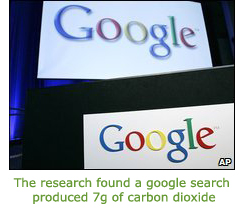'Carbon cost' of Google revealed
 Two search requests on the internet website Google produce “as much carbon dioxide as boiling a kettle”, according to a Harvard University academic.
Two search requests on the internet website Google produce “as much carbon dioxide as boiling a kettle”, according to a Harvard University academic.US physicist Alex Wissner-Gross claims that a typical Google search on a desktop computer produces about 7g CO2.
However, these figures were disputed by Google, who say a typical search produced only 0.2g of carbon dioxide.
A recent study by American research firm Gartner suggested that IT now causes two percent of global emissions.
Dr Wissner-Gross’s study claims that two Google searches on a desktop computer produces 14g of CO2, which is the roughly the equivalent of boiling an electric kettle.
Carbon emissions
The Harvard academic argues that these carbon emissions stem from the electricity used by the computer terminal and by the power consumed by the large data centres operated by Google around the world.
Although the American search engine is renowned for returning fast results, Dr Wissner-Gross says it can only do so because it uses several data banks at the same time.
Speaking to the BBC, he said a combination of clients, networks, servers and people’s home computers all added up to a lot of energy usage.
“Google isn’t any worse than any other data centre operator. If you want to supply really great and fast result, then that’s going to take extra energy to do so,” he said.
Dr Wissner-Gross said he was working on a website called co2stats.com which helps companies identify “energy inefficient” aspects of their websites.
In a statement on its official blog, Google said that Dr Wissner-Gross’ figures were “many times too high.”
The firm said that a typical search returned a result in less than 0.2 seconds and that the search itself only used its servers for a few thousandths of a second. This, said Google, amounted to 0.0003 kWh of energy per search - equivalent to 0.2g of CO2.
“We’ve made great strides to reduce the energy used by our data centres, but we still want clean and affordable sources of electricity for the power that we do use,” said Google in its statement.
“In 2007, we co-founded the Climate Savers Computing Initiative. This non-profit consortium is committed to cutting the energy consumed by computers in half by 2010 and so reducing global CO2 emissions by 54 million tons per year. That’s a lot of kettles.”
Story from BBC NEWS: website
Published: 2009/01/12 10:49:07 GMT
(c) BBC MMIX
You can return to the main Market News page, or press the Back button on your browser.

